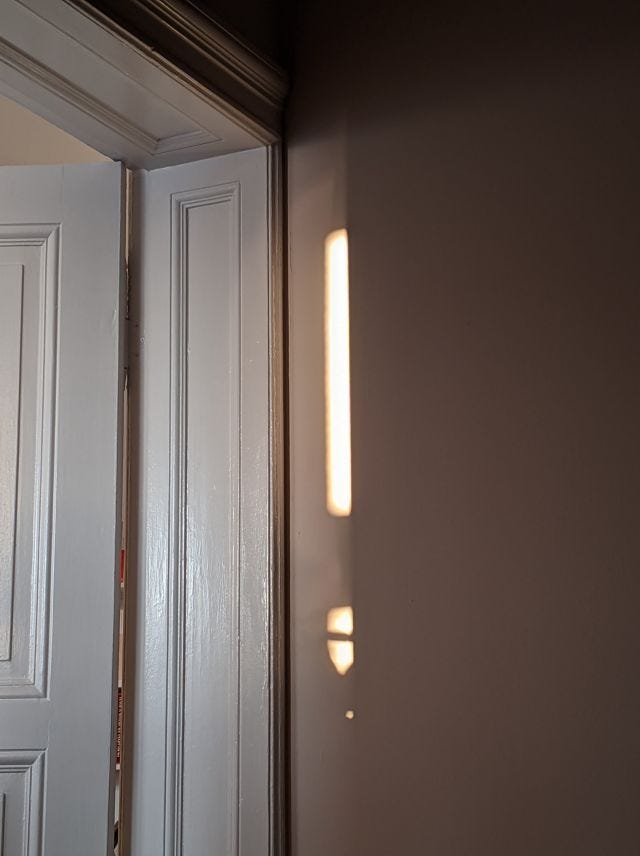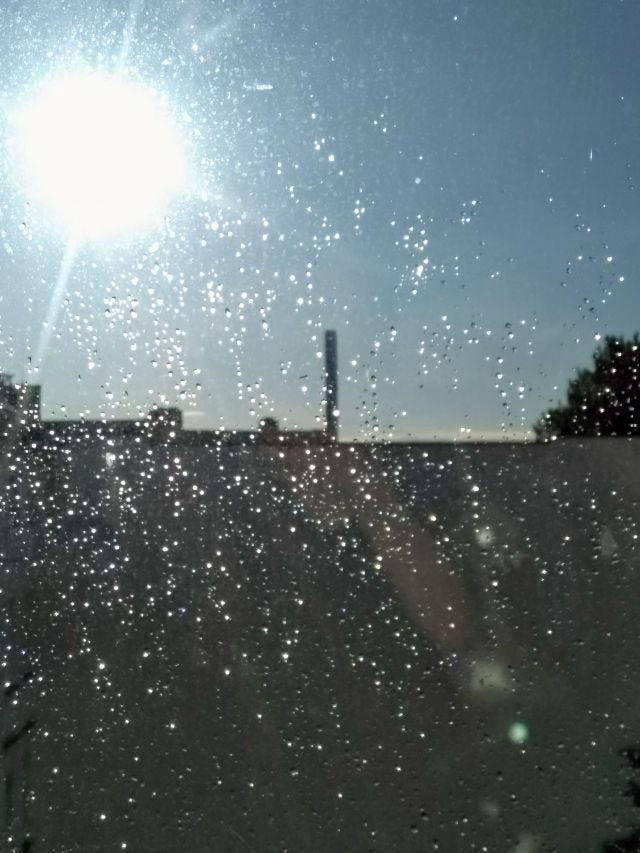fever took hold of time
To begin with, a rushed warp – the acceleration of panic. A thousand thoughts rushing to replace feelings. A sense of scatteredness in the absence of movement. Then, a settling in to semi-stasis. The deserted quiet of the street below, lined with shuttered cafes, tips into disquiet. I begin to write the date before entries in my notebook, something I never used to do with any consistency, because time is slipping.
What even is a month? Mornings carry possibility and thinking, assisted by espresso and a seamless stretch of skies unpunctuated by planes, with birds that sing April ascendant. Afternoons, terrible to push through. Walking helps, but God, in this walking-walking, if I am not running against myself. Evenings, when the dread settles, or when the sadness, with the soul’s grounding in darkness, sets in. Peering further into that sadness is what’s needed, for cases of experiencing melancholy but of being afraid to grieve.
So, the time of the day is told through its moods. The old names for days feel like intrusions; a faint idea of what used to happen on Saturday night, or could have happened, leaves you wanting. The new sadness belongs to Saturday evening rather than Sunday afternoon. The new separation cuts into old wounds. With the names of the days lost, and weeks a blur of the days’ small activities, a month is measured as twenty-eight mood cycles, or one cycle of the moon. People find solace in the moon.
There are nights lit fiery by riots, explosions, and uprisings, passed through media from there to here. These ignited interruptions to the longer interruption of the pandemic year are the kairos (the time of transformation) to the chronos (clock time) that has been all but lost. What constitutes the ‘all but’ is the stuff of intractable project managers, work shifts, deadlines. Without the usual sociality, signals are sent to and from friends like flares through the dark. Whether three streets or three continents away, everyone seems the same distance apart. Almost everyone is out of reach and everyone wants to be in touch. Those that make up the ‘almost’ are those that sustain us, keep us alive.
Within this oscillation of time, the video-call lens bounces in and out between a remoteness in which full expression is unperceivable, and an empathic osmosis where the boundary between two is thinner than before. Suddenly, there is sex, death, a detail from your childhood, from your bookshelf, shot-through understanding, and then again, you are lost. I can see you, but are ‘you’ there? Are you there?
Focus spirals off the page. Changed rhythms of temporal impression throw the line of writing into crisis. Still, I write – not to publish, but to release and shift state – the motion of writing long-hand is another way of running. Stretching the psoas muscle, which wraps around the seat of the spine through your pelvis to your inner thigh, calms the impulse for flight. Reading aloud is a throat-opening, presence-building activity. I speak a poem by Etel Adnan with the line, fever took hold of time. Some nights I wake up in a sweat, but it is not, to my knowledge, that fever.

“Slow-motion molasses to utter haste,” writes analyst Jamieson Webster of traumatic time, “with after-effects and shockwaves that inspire a race to cover it all over, to seal the tear in the fabric of reality. Also, the wish to get out of the uncertainty, the anxious wait.” Waiting for what? “Waiting to live a life until we are sure we won’t be so vulnerable.” Psychotherapist Pillar Jennings answers, indirectly; she is not talking about epidemiological safety, but the barriers of early-life trauma.
Psychically, this waiting is also the stuckness of a depressive position. A few years ago I made a proposal for a collection of essays titled, “Treading Time”, some early thoughts for which were seeded in the archives of this letter. The project was influenced by Lauren Berlant’s resistant present, which identifies a “hesitation in time that is not in time with the world of drives and driving; nor is it in a mapped space, but in a space that is lost.” The feeling of suspension, deferral – of action and desire – which exists within the always-on connection of late (as in, wishfully, over) capitalism. The proposal was not accepted and, like the impasse of its subject, I lacked lively direction for it. I came back to those notes during this year-on-pause:
“A lived sense of provisional movement without forward progress, like treading water or jogging on the spot. Exertion is necessary to keep afloat or on top of things but narratives of sequential development have been lost.”
I was implicitly aware of this slow fog at the time – enough to write about it from inside it – but I am more able to part it with the vision of my present eyes, looking back.
There is a significant difference, if not a complete distinction, between brakes pressed on from within, and circumstantial restrictions enforced from the outside. In Enduring Time, Lisa Baraitser expands on how such impasses can be imposed – by the deferrals of the state, by sickness or grief, by responsibilities of care, by imprisonment – and so are debilitating. She writes of a (postcolonial, postmodern) time “radically suspended”, tied to a lack of agency. This far precedes pandemic time, for so many people’s circumstances, although exit restrictions and quarantine, with a strictness of time and space contained in their names, have compounded the condition. While the limitations of a lockdown for someone who feels ‘healthy’ can be experienced as a halting of activity that gives onto boredom, mundanity is currently a best-case scenario. Impasses are uneven, and can be jolted at any moment into crisis.

During a walk in traffic-light autumn, a friend asks: “Why is it that so many people have been struggling to write this past year?”
“Existential crisis?!” I respond spontaneously. “Mass death...”
By ‘write’ I take her to mean Writing: if not exactly a story with a beginning, middle, and end, then prose linking sentence to sentence; lines of telling and flow.
I sought some more responses:
Gabriella de la Puente: “I can make one sentence, but I can’t put sentences together so easily, or remember what the last one said.” (April 2020)
Renee Gladman: “I was afraid to say anything because of the way time tremors.” (June 2020)
Jaleh Mansoor, on social media, in the aftermath of Beirut: “That’s what an event is: the material fallout precedes articulation.” (August 2020)
To understand more why it has barely felt possible to formulate ‘a piece’, or even to piece together something to send you from the abundant notes without narrative I’ve been making (writing, as I say, every day, just not Writing), I returned to Denise Riley’s Time Lived, Without Its Flow. It’s a meditation on her experience of time immobilised by grief following the sudden death of her son. In this pool, “a great circle with no rim,” the forward momentum of the sentence became impossible. “This lacuna,” she described, once time’s freezing had somewhat thawed, “must be due to the fact that the experience of atemporality systematically undercuts its own articulation.” This temporal paralysis, although relating to her specific experience of bereavement, resonates with the many encircling griefs and grievances, losses and absences, of the present. The form of a circle, like the black hole emoji, sinks the capacity for narrativization.
“A noun and a verb want to go somewhere,” Riley later commented in conversation with Emily Berry, “the sentence leans into its own future.” But there is also something about finishing that fits difficultly with posterity – or its fading. Being in the middle of writing or creating gives rise to temporalities beyond the everyday. I don’t believe that writing happens away from living – they happen together – so “staying in the fray” of both is another way of present-dwelling, and of holding off an ending.
In the end, I pieced together a letter because the destination of a handful of readers in the close future became just enough. Because correspondence is nearly all I have been prolific in, through these months and months of cruel crystalline skies, orange-lit hospital windows, spirit-blown trees, and now, great dark. I don’t have a fever. I do have time. I can’t see you, but [I think] you are there.
Inter-text:
– Emil Cioran, via Nuar Alsadir: “Every thought derives from a thwarted sensation.” | On chronos and kairos: Kimberly Hutchings, Time and World Politics: Thinking the Present, via Lisa Baraitser, Enduring Time. | Lauren Berlant, Cruel Optimism. | Gillian Rose, Love’s Work: to “stay in the fray, in the revel of ideas and risk”. | Sarah Nicole Prickett: “My preference is to work on things forever, very sporadically”. | Anne Boyer on posterity, poetry and post-privacy, Clickbait Thanatos.
*accepting correspondence tips for the book-writing fund via PayPal: hnnhstz@gmail.com*



